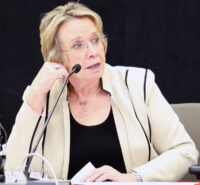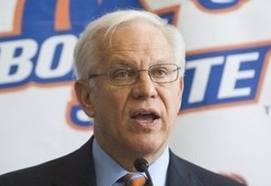Idaho’s higher education task force seemed to acknowledge the inevitable Friday: The state will not meet its much-ballyhooed “60 percent goal” by the 2020 target date.
The group also looked at this goal in a new, daunting way. In the next few years, Idaho will need to find room for a staggering influx of 40,000 students.
The 36-member task force got back to work — and confronted harsh realities — during a full-day meeting at Boise State University. It was the committee’s third meeting since January, when Gov. Butch Otter said he would convene university presidents, lawmakers and business leaders to discuss Idaho’s higher education system.
Otter assembled the task force to address Idaho’s chronically low college graduation rates. Since 2010, the State Board of Education has promoted the “60 percent goal:” getting 60 percent of the state’s 25- to 34-year-olds to hold a postsecondary degree or certificate by 2020. But college enrollment numbers have actually dropped — and in 2015 and 2016, only 46 percent of high school graduates enrolled in college. This trend renders the 60 percent goal all but unattainable.
The task force walked back the 2020 target date Friday. One subcommittee suggested a 2025 deadline.
But if high school graduates decide to continue their education, is there someplace for them to go?
This question defined Friday morning’s discussion.
Currently, Idaho’s two- and four-year schools enroll about 100,000 students. To meet the 60 percent goal, Idaho will need to accommodate an additional 40,000 students.
To put that in perspective, the state’s largest university, BSU, enrolled a record 23,886 students in 2016.
“We can’t build two new Boise States to accommodate 40,000 students,” said Mike Mooney, a retired bank executive who serves on the task force.

Said Emma Atchley, a State Board of Education member from Ashton: “The (existing) system is not going to work for us. … We risk becoming irrelevant if we don’t make some changes.”
Mooney and Atchley headed a subcommittee that recommended a fundamental shift in higher education delivery. Since it’s unlikely that legislators would spend nearly $200 million a year to expand the existing system — and since it’s unrealistic to pass the added costs on to students — their subcommittee recommends a big push in online education.
They envision a network that uses libraries and extension centers to reach into almost every Idaho community. To pull this off, state universities might need to agree to offer some uniform “foundational” courses, Atchley said.
Task force member and BSU student Josh Scholer questioned the shift. He said the task force should work to make traditional face-to-face education more affordable and accessible, instead of concentrating on a shift to online courses.
Mooney does not see the online push as an either-or proposition.
“We’re not talking about tearing down the existing system,” he said. “We’re talking about building it up and improving it.”

On Friday, the task force didn’t attach a dollar figure to an online initiative — or any other effort to boost college enrollment and graduation numbers. But the task force agreed on the need for a long-term funding plan — similar to Otter’s K-12 education task force, which convened in 2013 and drew up a five-year plan, including the $250 million career ladder to boost teacher salaries.
A long-term blueprint will give legislators a good idea of the cost of the 60 percent goal, perhaps for the first time, said BSU President Bob Kustra. And it will get university leaders and lawmakers out of the habit of making short-term budget decisions.
“We’ve been playing around incrementally for years here,” Kustra said.
The task force will meet again Aug. 4, and is expected to make recommendations in September.
